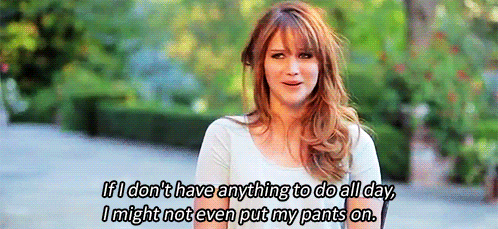The first and most obvious perk of Facebook is how it allows us to stay connected to our friends, family, and our readers, all without ever having to
 |
| Image from WiffleGif |
- Facebook does have a cap on how many friends you can have, but there is no limit on how many people can like your page.
- You don't necessarily want to share every aspect of your life with complete strangers.
- You want one place for people to be able to go on Facebook to find out about you as an author.
- You can advertise your products on your page, but not your profile.
All of these reasons are still relevant. There are ways around them, which I'll get into in a minute. But what is the deal with fan pages, and why can you never see what they post anymore?
- With Facebook's new algorithms, it is harder and harder to get your posts seen. What does that mean? It means that if you have 500 followers, your posts might only reach 5. It isn't impossible to be seen (check out this great post on how to improve your page), and it does keep those annoying people who post every five minutes out of your feed, but it has made things significantly harder.
- If you want your posts seen, more people have to like it or comment on it. So if your post reaches only 5 followers who aren't very active on Facebook, or liked you because of some Rafflecopter contest and really have no idea who you are and nothing to say to you, then your only other option for visibility is paying to boost it. And who wants to do that when your post might just be reaching out to your followers to see how their day was?
- Photos and videos are more likely to be seen than links or text posts. Don't believe me? Check out this post on Facebook statistics on fan pages. Again, not necessarily a bad thing. But if you are trying to post a link to a blog post you just wrote about social media (*ahem*) then it probably isn't going to be seen by many. Google+ will love it, but we'll get into that later.
Basically, there are flaws with using either your Facebook profile or you fan page to engage readers. That being said, it still is a GREAT way to engage readers. Let's talk about the pros and cons I've already pointed out.
Facebook has a cap on how many friends you can have.
Since Facebook now allows people to subscribe to your page, this isn't an issue anymore. As far as I know, there isn't a cap on subscribers, and you should still be able to adjust your privacy settings to where friends can see certain posts (like ones of your family) and specify which specific posts you want the public to see--like ones about your books or general activities. Which brings us to...
Privacy
You can still have a Facebook profile and have privacy. And you don't have to have two profiles to do it. I can tell you from experience that it isn't worth the hassle to have two Facebooks, and let's not forget that Facebook actually frowns on that kinda thing. Last time I checked, you can get banned for it. Not sure how you would get busted, but still. Not worth it anyway. You can adjust your privacy settings on your profile to keep your personal data and photos safe while still being able to share content with the world. The easiest way to do this is to adjust your privacy settings so that all of your posts are set to be viewed only by friends (or people on a certain list), and then when you go to post something you want everyone to be able to see, set that particular post to Public by clicking on the little icon on the bottom right corner of the status dialogue box.
Easy-peasy. So privacy is no longer an issue as long as you have your default settings set to private. Even if that means creating a list that only has the family and friends you want to view every post and having that as your default.
You want one place for people to be able to find relevant information about you as an author on Facebook.
Having a profile is okay for this, but having a Facebook page is still probably the best way. You don't want your profile to turn into too much of a marketing tool. The reason why Facebook is a marketing tool is because it helps you connect directly with people who want your product and lets them spread it via word of mouth. And as an author, that is still your bread and butter. So even if you don't post tons on your Facebook page, having it is still a good idea. To me, personally, it is more professional as well. I'm more likely to like an author's page rather than add them as a friend just because everyone has boundaries and you have no idea what the next person's boundaries are going to be. I welcome it, but I don't have kids and I use a pen name.
Blatant advertising
This is a tricky one. I know Facebook frowns on advertising products or contests from your profile (or they used to, anyway), but you still see it happen. All. The. Time. I also see contests where you have to share links on your Timeline or a friend's Timeline to enter, and that is supposed to be a no-no too. This is what Facebook says about promotions from Pages:
3. Promotions may be administered on Pages or within apps on Facebook. Personal Timelines must not be used to administer promotions (ex: “share on your Timeline to enter” or “share on your friend's Timeline to get additional entries” is not permitted).
That being said, I didn't find anything in the Community Standards that says you can't advertise a product on your Facebook profile. It would probably be way too much of a pain to police anyway. I ran a Google search too, but came up empty. However, I before you do anything like that, I suggest going over the rules yourself.
So can you advertise on your Facebook profile? Pretty much. But do you want to do that all the time? Probably not. Don't be a spammer. That's a great way to get people to delete you or hide you.
Now let's talk Facebook pages and those pesky algorithms.
I have been just as likely as the next person to bitch about these. I had my Tumblr linked to bond over fangirl stuff, but I realized those posts weren't being seen. Same thing with Twitter. So I linked stuff that I thought was cool, but those weren't being seen either. Then I read that text based posts were more likely to be seen than links or anything else, so I tried that. But those weren't being seen either.
 |
| Image from PhotoBucket |
Other tips and tricks to get your posts seen without paying to boost them:
Obviously, having your Twitter linked to your page is a bad idea. Keep the random posts to a minimum and instead post quality content. Don't post every fun link you come across or every funny picture. Engaging your readers doesn't mean spamming them, and the more you spam your Facebook feed, the less likely your posts are to be seen. So keep your posts to a minimum while still trying to engage daily. I've read that liking or saying congratulations will boost a post according to the algorithms, but I haven't seen any data on that. And it feels silly (yes, I tried it). Can't hurt to like your own posts, though. But also make sure you are redirecting your readers there. Let them know you just posted news and get them to go look and like it. Maybe even hold a contest and randomly choose a winner from those who like the post in a 24 hour period.
The Bottom Line
As you can tell, there's a lot of back and forth in this post about using your profile to connect with readers or just keeping it to a Facebook page. Obviously, you have to find what works for you. But keep this in mind before you let me talk you out of getting a Facebook page: While some readers will want to connect with you directly and talk to you about whatever else you might have in common (for me, it is fangirling over various things), some readers simply want a place where they can go to see your updates. And while it is possible to keep your private life private on a Facebook profile, it might not be your ideal way to reach readers. Test the waters. Do what works for you. Just don't let a lack of interaction on your Facebook page leave you feeling like you are failing at Facebook and give up on it completely. Having a presence there, even if it is small, will still help.
What are you thoughts on the changes with Facebook? Have you found different data than me on Facebook's policies or algorithms? Tell me I'm wrong! I'm on the fence about Facebook, so I'd love to have someone win me back over to loving it again. =D
Check back next Monday when we talk about other social media platforms and how to utilize them to your benefit without getting overloaded.


No comments:
Post a Comment